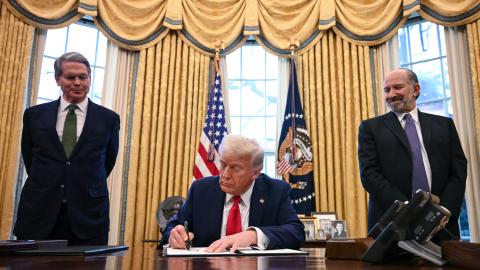ObamaCare survived both the Supreme Court challenge to its constitutionality at the beginning of 2012 and the election close to year's end. With these obstacles to its existence vaulted, the health-care plan can not be repealed before its full implementation begins in 2014. Even so, this disastrous piece of legislation is actually facing its greatest challenge yet. The Obama administration must now begin putting the practical pieces of its byzantine law into effect.
ObamaCare, all 2,700 pages of it, is being activated in two phases. First is the imposition of new rules and regulations on insurers, a process that has already begun. It is now clear that the law will not curb rising health-care costs, as its advocates heatedly and repeatedly promised during the year leading up to its passage in 2010. Led by the president, they claimed the new law would reduce health-insurance rates by $2,500. Since its passage, rates have instead gone up by more than $3,065—a spread in excess of $5,500 per family. Even more requirements will mean even higher costs. And more requirements are coming.
The second phase is more troublesome. The law calls for the establishment of 50 health-care "exchanges," one per state. The battle over the development of these exchanges will dominate the health-policy debates in 2013, and the ultimate disposition of that battle will tell us most of what we will need to know about the future of innovation and access to medical care in our system.
What is an "exchange"? Exchanges are, quite simply, organized marketplaces aimed at facilitating the purchase of insurance. While the ObamaCare law calls for them to be state-run and regulated heavily by the federal government, they could also be quasi-governmental or nongovernmental. Exchanges are not insurers themselves, but they work with private insurers and give insurers a platform for selling their products while making it easier for individuals to purchase insurance.
Most conservative health-care experts have no theoretical problem with the concept of an exchange, nor do liberals (though advocates of a single-payer national system would deem exchanges unnecessary). On the right, the Heritage Foundation was for years the leading proponent of the exchange idea—a clearinghouse that would help organize the marketplace to promote the rational and cost-effective purchase of health insurance. Even the use of the term "exchange," which is so confusing, was introduced because it sounded market-friendly. Exchanges were to provide consumers with information about how best to purchase health insurance, and which products would work best for them. Massachusetts established a version of an exchange, called the Connector, as part of Mitt Romney's overall Massachusetts health reform in 2005.
The Obama exchanges are of a different order entirely, however. They will not merely be advisory; they will be policymaking bodies and enforcement mechanisms. They are designed to take control of the way health-care access is granted at the state level—the cost, the shape of the coverage, and who is getting how much care. According to the text of the Affordable Care Act, the state-based exchanges must determine who has access to the exchanges; restrict the number of plans that can participate; set up a tiered system of insurance plans; regulate the practices of participating insurance plans; establish call centers and certain types of forms for consumers to use; and monitor the way companies market plans to consumers in a variety of ways. And since the 2,700-page statute is not detailed enough, the administration is expanding upon these requirements through the drafting of ongoing regulations—13,000 pages of them so far, and counting.
The Obama exchanges have a Big Brother quality to them. They were created to keep track of the Department of Health and Human Services-approved levels of essential benefits, who receives subsidies and of what size, and who gets insurance and who does not. The annual operating costs of running the Obama-envisioned exchanges are still unknown; most estimates are in the $30 million range per state, but some go as high as $100 million. Oregon is hiring 150 people for its call center alone.
Outgoing Heritage Foundation president Edwin Feulner, offended by President Obama's frequent claims that he was adapting the plan of the conservative think tank, took to the pages of the Washington Post to debunk the association. "True exchanges are simply a market mechanism to enable families to choose their health insurance," Feulner wrote. "President Obama's exchanges, by contrast, are a vehicle to introduce sweeping regulation and federal standardization on health insurance."
Most governors, and the vast majority of Republican governors, have so far refused to set up exchanges in their states. They argue that the rules governing exchanges are so over-directed and intrusive that governors who want to set up exchanges as they see fit have little to no latitude with which to do so. Furthermore, the exchanges will be the key apparatuses implementing and enforcing unpopular components of the Obama law, such as the individual and employer mandate, and Republican governors want nothing to do with those provisions.
The Obama exchanges are comparable to the old saw about the Holy Roman Empire being neither holy nor Roman nor an empire: They are not truly state-based, nor are they truly market-enhancing. Rather, they impose a high level of federal control over state authorities. They also privilege government control over the free-market idea of providing information so that consumers can make their own decisions.
The exchanges, moreover, will compel governors and their employees to serve as their enforcers, collecting information about citizen participation, determining who has been naughty and who has been nice, and informing the IRS about them so that it can mete out appropriate punishments.
The administration is playing coy about how exactly this will work by sitting on key regulations and leaving crucial questions unanswered until the last minute. This approach has left Republican governors with the sense that the exchanges must be done in the Obama way but without the Obama management, thus permitting the administration to have a convenient partisan rival on whom to place the blame when things go bad.
For all these reasons, conservatives generally argue against any participation in the exchanges. Some are quite adamant on the point. Daniel Horowitz wrote on Red State that governors "wavering" on whether to participate "must hear from We the People." The CATO Institute's Michael Cannon, one of the most stalwart and knowledgeable opponents of the Obama law, wrote that "every conservative and free-market group, including the Heritage Foundation and the American Legislative Exchange Council, has advised states to refuse to create an exchange and to send all related grants back to Washington."
This consensus among conservatives and among Republican governors does provide opponents of ObamaCare with an opportunity to push back against it. But a straight-up rejection of the exchanges may not be the wisest approach. By removing themselves from the game, conservatives will be sitting on the sidelines, guaranteeing that the Obama administration will further consolidate its control over health care.
_____
Unfortunately, ignoring the exchanges, or refusing to set them up, will not mean that states will be liberated from them. Under the all-encompassing intrusiveness of the Affordable Care Act, if a governor chooses not to set up the exchange, the federal government is supposed to go into that state and set up its own version of the exchange. This gross violation of federalism means that governors and the citizens who elected them will be saddled with health-care exchanges that conform to the ObamaCare vision, whether they want them or not, and whether they choose to establish them or not.
Republicans cannot afford to sit back and assume—or hope—that the exchanges will fail. Even if they do fail, there is no guarantee voters will agree with Republicans and conservatives about the causes of the failure. When the exchanges fall short of the impossible expectations, voices from the administration (and the media) will try to pin the blame on Republican governors who refuse to take advantage of what they see as the extraordinary beneficence that is ObamaCare. They will say, "If only the Republicans had participated…"
In addition, ignoring the exchanges will not be without cost for the governors. Governors can and will be criticized for ceding so much authority to the federal government, especially when they had at least the appearance of a chance to set up the exchanges themselves. Idaho Governor Butch Otter sees the development of a federal exchange in this light. He decided to set up an exchange because he did not want to "do nothing and be at the federal government's mercy in how that exchange is designed and run." Instead, Otter said, he preferred to "take a seat at the table and play the cards we've been dealt."
Otter is trying to make the best of an impossible choice. If GOP governors do nothing, as most are doing, then the Obama administration will impose unpleasant exchanges on their states and can say that the governors could have prevented the imposition by acting. And yet, if GOP governors go along and create lemming exchanges, as Otter is doing, they will be criticized for being complicit in creating an Obama-directed exchange.
Being faced with a bad choice does not, however, mean that governors such as Otter are without options. ObamaCare is the president's signature initiative, and he desperately wants it to succeed. Federally run exchange, moreover, are expensive and burdensome to manage, and the Obama administration wants to limit the number of exchanges it is saddled with operating. For both of these reasons, the Obama administration needs the cooperation of a significant number of governors, and there are just are not enough cooperative Democratic governors around to satisfy this need.
The Republicans control 30 governorships. If they can find a way to act in relative concert, they will have serious leverage. In addition, each governor has his own resources for engaging and communicating with citizens. Standing behind a united front of governors to extract concessions may be the only way Republicans can try to shape the health-care policy landscape over the next few years.
Here's how they should proceed.
Governors should refuse to set up state-based exchanges until and unless the Obama administration makes changes that will allow governors the flexibility to create workable non-ObamaCare exchanges. If the administration agrees, and allows state experimentation in areas such as the benefit structure, the size of the subsidies, the regulation of the products, and the like, then the product the GOP governors create will no longer be ObamaCare. If the administration refuses, then the governors will have articulated a powerful reason why they could not in conscience do the Obama exchanges and will have also laid out a vision for conservative reform that Republicans can tout in 2016.
Thirty governors standing together would not be a form of accommodation so much as a resistance movement. If Republican governors use their power to demand real flexibility in how they establish their exchanges, they would both preserve freedom for their own citizens as well as establish a pathway for change when a Republican next takes the seat in the Oval Office.
The flexibilities should include freedoms that the Obama administration is not eager to provide, and some of them would no doubt require legislative changes at the federal level. The most important changes required would be the flexibility for governors to reduce the law's insurance subsidy levels. ObamaCare's subsidies, which go to families earning as much as $90,000, will not only cost the federal government a vast amount of money, but reveal ObamaCare to be a middle-class entitlement rather than a program to help low-income families and individuals get health insurance.
Also, states would need the freedom to offer insurance products without the expensive federal mandates known as "essential minimum benefits." ObamaCare creates a system in which the federal government effectively sets a minimum level of benefits that exchange-based insurers must provide, thereby discouraging the creation of high-deductible plans that can reduce costs.
Governors should also push for the establishment of a Health Savings Account-type option to allow people to save for their own health-care costs. HSAs are another way to encourage individuals to make value-based health-care decisions based on cost and quality rather than on merely selecting the most expensive service that one's insurance will cover. And they can work to force the administration to allow all state-approved insurance products to be offered in the exchange, rather than just the Obama administration-approved plans, thereby giving consumers more choices.
These freedoms, if granted, would allow governors to establish more market-oriented, less government-directed systems that work for their particular states. Utah Governor Gary Herbert, for example, has requested permission to establish an exchange based on the principles of "defined contribution, consumer choice, and free markets." In doing so, he wants Utah, not the federal government, to be able to establish the marketplace, determine exchange eligibility, and oversee the participating plans.
At the same time, the Utah plan would not enforce the federal mandate, distribute the federal subsidies, or adhere to federal rules regarding how many telemarketers must staff the call centers. This approach would save the Utah state government a great deal of hassle and money and allow Utah to provide more choices of plans to its consumers.
Herbert has formally applied to have Utah's version of the exchange, which was implemented in 2011, accepted as meeting the terms of ObamaCare. The Department of Health and Human Services has been cautious in responding, giving conditional approval but also noting that Utah has a long way to go to conform to the department's requirements.
While the "conditional" approval suggests that HHS is sufficiently concerned about the public's perception that they wish to appear flexible, the likelihood is that Utah will not have its exchange approved unless the state makes significant movement in the ObamaCare direction. Herbert's position, while admirable, would have more power behind it if he weren't standing alone but with more than two-dozen governors.
In Utah and elsewhere, the Obama administration will surely be unwilling to grant these flexibilities, but if Republican governors offer to participate under these conditions, the administration will also no longer be able to say the governors did not even try.
In addition, fights over flexibility will enable the governors to make the case to the public regarding why these changes will improve access and reduce cost. Making such a case can serve an important educational function, drawing attention to the power of conservative ideas, even if those ideas do not get implemented in the short term.
_____
The Obama administration recognizes the threat of gubernatorial unity in opposition to Obama's conception of exchanges. For this reason, it has taken an extremely political approach to what is supposed to be the relatively non-political process of statutory implementation. As the Bush administration was implementing Part D Medicare prescription drug coverage after its passage into law at the end of 2003, it published the rules quickly and senior Bush officials traversed the nation on a Medicare bus tour to encourage seniors to sign up for the new coverage. The Obama administration, in contrast, is even now, nearly two years after passage of the bill, still finalizing the rules governing the parameters of the exchanges.
The implications of these delays go beyond the burdens on the states. Insurance companies need the rules to establish, price, and plan for consumer feedback for all the products that will be sold in the exchanges. This is a complicated process, requiring careful calibration and actuarial analysis. The delayed or unclear rules make it less probable that the insurance companies will be able to meet the Obama administration's deadlines or serve those they insure in the best way possible.
We can see the political nature of the administration's approach to implementation in the horrifically titled "Proposed Regulation on the Patient Protection and Affordable Care Act; Standards Related to Essential Health Benefits, Actuarial Value, and Accreditation." According to the U.S. Chamber of Commerce, Obama's HHS "withheld this proposed regulation until after the election, even though it was signed on August 1, 2012, over three whole months before the election."
As the Chamber noted, "The almost four months of delay and review in the Secretary's office, between August 1st and November 14th, in and of itself indicates the complexity of this regulation and highlights the absurdity of a 30-day review period for the regulated public." The Chamber dryly averred that "whether this delay in publication was due to political reasons surrounding the elections or not, clearly the public is entitled to a time period for review…"
What the Chamber did not note is that the Obama administration not only delayed this regulation until after the election, but until after the meeting of the Republican Governors' Association in mid-November. The reason for delay until after the election is obvious, but the post-RGA date is significant as well. Putting out the high-profile regulation after the election but before the RGA meeting would have given the Republican governors time to cohere around a unified strategy to oppose the exchanges. This potential for a united front by the governors in opposition to the Obama exchanges and in favor of additional flexibility is the greatest continuing threat to the viability of the ObamaCare vision.
If the GOP governors stand together, seek to educate voters, serve the public, and demand real flexibility and the ability to design exchanges as they see fit, there remains the possibility that at least a few states can develop health-care systems that will allow for some movement toward a consumer-driven model. The alternative vision is the Obama approach of government diktat, whereby federal bureaucrats continue to use the regulatory state to impose a variety of cost controls—a losing and unviable strategy.
So far, the Obama approach, which limits the use of Health Savings Accounts, taxes Flexible Spending Accounts, and gives consumers a narrow range of choices, has overcome its most potent legislative and judicial challenges. Thirty Republican governors now have before them the opportunity to mitigate or stave off the looming disasters facing our health-care system.

















